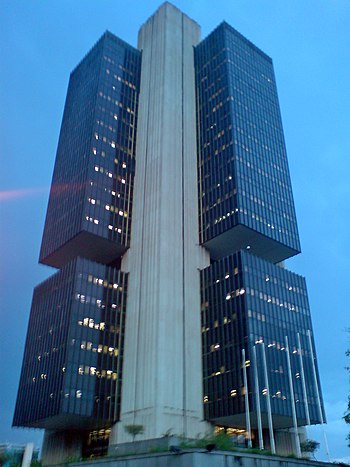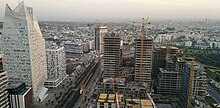The Business and Economics Portal Business is the practice of making one's living or making money by producing or buying and selling products (such as goods and services). It is also "any activity or enterprise entered into for profit." A business entity is not necessarily separate from the owner and the creditors can hold the owner liable for debts the business has acquired. The taxation system for businesses is different from that of the corporates. A business structure does not allow for corporate tax rates. The proprietor is personally taxed on all income from the business. A distinction is made in law and public offices between the term business and a company such as a corporation or cooperative. Colloquially, the terms are used interchangeably. (Full article...) Economics (/ˌɛkəˈnɒmɪks, ˌiːkə-/) is a social science that studies the production, distribution, and consumption of goods and services. Economics focuses on the behaviour and interactions of economic agents and how economies work. Microeconomics analyses what is viewed as basic elements within economies, including individual agents and markets, their interactions, and the outcomes of interactions. Individual agents may include, for example, households, firms, buyers, and sellers. Macroeconomics analyses economies as systems where production, distribution, consumption, savings, and investment expenditure interact, and factors affecting it: factors of production, such as labour, capital, land, and enterprise, inflation, economic growth, and public policies that have impact on these elements. It also seeks to analyse and describe the global economy. (Full article...) Selected article General Motors Company (GM) is an American multinational automotive manufacturing company headquartered in Detroit, Michigan, United States. The company is most known for owning and manufacturing four automobile brands: Chevrolet, Buick, GMC, and Cadillac, each a separate division of GM. By total sales, it has continuously been the largest automaker in the United States, and was the largest in the world for 77 years before losing the top spot to Toyota in 2008. General Motors operates manufacturing plants in eight countries. In addition to its four core brands, GM also holds interests in Chinese brands Baojun and Wuling via SAIC-GM-Wuling Automobile. GM further owns a namesake defense vehicles division which produces military vehicles for the United States government and military, the vehicle safety, security, and information services provider OnStar, the auto parts company ACDelco, and a namesake financial lending service. Selected image
Selected economyThe economy of Morocco is considered relatively liberal, governed by the law of supply and demand. Since 1993, in line with many Western world changes, Morocco has followed a policy of privatisation. Morocco has become a major player in African economic affairs, and is the 6th largest African economy by GDP (PPP). The World Economic Forum placed Morocco as the most competitive economy in North Africa, in its African Competitiveness Report 2014–2015. The economic system of the country demonstrated resilience to the climate, commodity, and pandemic shocks of the early 2020s. As of 2022, Morocco had the eighth-highest GDP in the Arab world, despite not being a significant oil-producing country. Since the early-1980s, the Moroccan government has pursued an economic programme toward accelerating economic growth with the support of the International Monetary Fund, the World Bank, and the Paris Club of creditors. From 2018, the country's currency, the Moroccan dirham, is fully convertible for current account transactions; reforms of the financial sector have been implemented; and state enterprises are being privatised. (Full article...) Selected quote"The public services to which the yeomanry were bound were not less arbitrary than the private ones. To make and maintain the high roads, a servitude which still subsists, I believe, every-where, though with different degrees of oppression in different countries, was not the only one. When the king's troops, when his household or his officers of any kind passed through any part of the country, the yeomanry were bound to provide them with horses, carriages, and provisions, at a price regulated by the purveyor. Great Britain is, I believe, the only monarchy in Europe where the oppression of purveyance has been entirely abolished. It still subsists in France and Germany. The public taxes to which they were subject were as irregular and oppressive as the services. The ancient lords, though extremely unwilling to grant themselves any pecuniary aid to their sovereign, easily allowed him to tallage, as they called it, their tenants, and had not knowledge enough to foresee how much this must in the end affect their own revenue. The taille, as it still subsists in France, may serve as an example of those ancient tallages. It is a tax upon the supposed profits of the farmer, which they estimate by the stock that he has upon the farm. It is his interest, therefore, to appear to have as little as possible, and consequently to employ as little as possible in its cultivation, and none in its improvement. Should any stock happen to accumulate in the hands of a French farmer, the taille is almost equal to a prohibition of its ever being employed upon the land. This tax, besides, is supposed to dishonour whoever is subject to it, and to degrade him below, not only the rank of a gentleman, but that of a burgher, and whoever rents the lands of another becomes subject to it. No gentleman, nor even any burgher who has stock, will submit to this degradation. This tax, therefore, not only hinders the stock which accumulates upon the land from being employed in its improvement, but drives away an other stock from it. The ancient tenths and fifteenths, so usual in England in former times, seem, so far as they affected the land, to have been taxes of the same nature with the taille."
TopicsRelated WikiProjectsDid you know (auto-generated) -
On this day in business history
General imagesThe following are images from various business-related articles on Wikipedia.
More did you know
Business news
SubcategoriesRelated portals
Things you can doUrgent and important articles are bold
WikimediaThe following Wikimedia Foundation sister projects provide more on this subject:
SourcesDiscover Wikipedia using portals |
Aja viide. Aja lugu.
Ilm, huumor ja uudiseid
Värsked postitused
- Pildid: spetsialistid valisid välja möödunud aasta kauneimad raamatud
- Skeletonisõitja Zunte saavutas EM-il 14. koha
- Galerii: Kumus avatud rühmanäitus käsitleb keha ja keskkonna põimitust
- VIDEO | Materjaliteadlane Jüri Liiv: tuuliku laba eluiga on kolm aastat ja nende utiliseerimine on pea võimatu, veel hullem on päikesepaneelidega
- VIDEO | Martin Helme: ärge uskuge muinasjutte sellest, et tuule- ja päikeseenergia on kohutavalt odav
Most Used Categories
- Arhiiv (6,050)
- Muu (2,859)
- Huumor (549)
- Uudiseid (622)
- Taskuhääling (397)
- Kultuur (124)
- Anekdoodid (28)















































